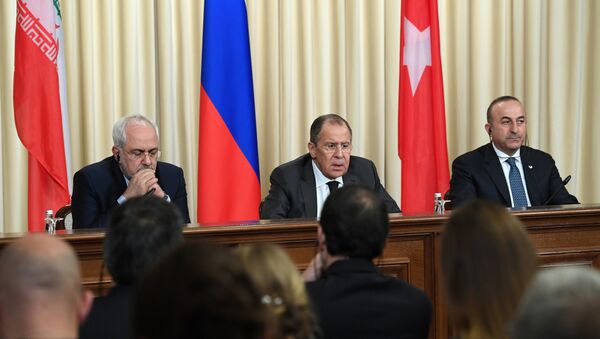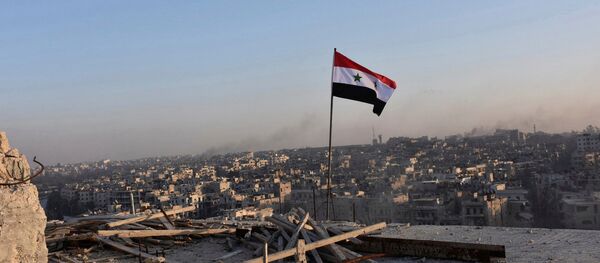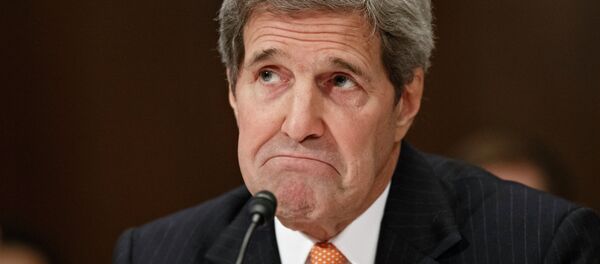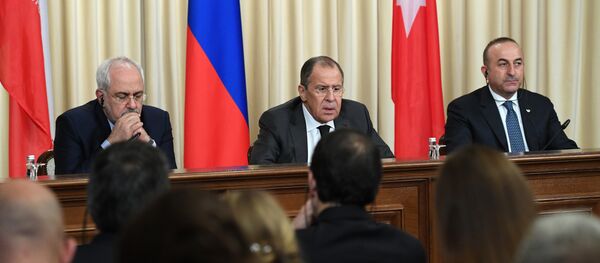Russia, Iran, Turkey Negotiating on Syria
According to Russian top diplomat Sergei Lavrov, the three countries want to help Damascus and the Syrian opposition to come to an agreement. They will also act as a guarantor of this agreement.
"Such an agreement is likely to include preserving Syrian territorial integrity and keeping Damascus’s control over the main regions. It may also presume a coalition government with pro-Turkish groups in Idlib," Gevorg Mirzayan, a lecturer at the Financial University under the Government of Russia, wrote in a piece for RIA Novosti.
"But the summit in Moscow vividly illustrated the new power dynamics around Syria, as former rivals Russia and Turkey sat across the table from each other while the US was not even invited to the talks," an article in Daily Telegraph noted.
The Kremlin said that it would welcome all interested parties at the negotiating table.
"We are not close for contacts with all other countries. We are inviting them to join the processes that, as we believe, have a positive potential," Lavrov noted.
"There should be no 'secular' Nusra, 'illegitimate' Damascus and attempts of a ceasefire to help militants. No one will change the rules," the author noted.
According to Lavrov, the "Moscow troika" is the most efficient format to resolve the Syrian crisis.
The Middle East Without the US?
Mirzayan noted that the implementation of the new format of Syrian settlement may create certain difficulties for the United States.
First, the deal may create a situation in the Middle East in which Washington’s efforts in the region will become unnecessary.
"Regional players will deal with all regional issues. Meanwhile, Russia will play the role of a mediator between them," the article read.
According to the author, the above-mentioned groups of factors imply that the US could be interested in undermining the newly-established troika. But this assumption could prove correct only if Washington continues its foreign policy in the Middle East.
"But If [new US President] Donald Trump focuses on US domestic problems the troika deal could even play in the hands of Washington. Russia, Iran and Turkey will be responsible for Syria and the fight against Daesh. As a result, Trump will be able to focus on the situation in East Asia," Mirzayan suggested.
What Iran Gains From the Deal
According to the author, Tehran is the biggest beneficiaries from the agreement. Tehran managed to protect Syria and exclude Turkey from the anti-Assad front.
However, the author noted, that Turkey also has nothing to complain about.
"Ankara was losing its military adventure in Syria. Its plan to topple Assad was unrealistic. Syrian militants demanded more and more money from Turkey. Its southeastern regions are now flooded with refugees," Mirzayan wrote.
The deal with Russia and Iran will help Turkey to find a way out of the conflict. Moreover, this deal will give Ankara certain control over the situation in Syria after the war. The troika cooperation will also prevent establishing a vast Kurdish autonomy in northern Syria.
Moscow's Role in the Deal
To some extent, the new format seems to be ambiguous for Russia, according to Mirzayan.
On the one hand, it can be regarded as victory. The Kremlin settled the issue of Ankara’s involvement in the Syrian war and established a negotiating format to resolve the crisis.
"This format could help Russia consolidate its allies in the region for real efforts against Daesh. If Raqqa is liberated Russia would emerge victorious in Syria," the author pointed out.
On the other hand, by making the troika deal, Russia decided for the first to lead the process and bear responsibility for the results.
"If the deal works Russia would emerge as a constructive peacemaker in the Middle East. But if not this would deal a heavy blow to Russia’s reputation in the global politics," Mirzayan concluded.








